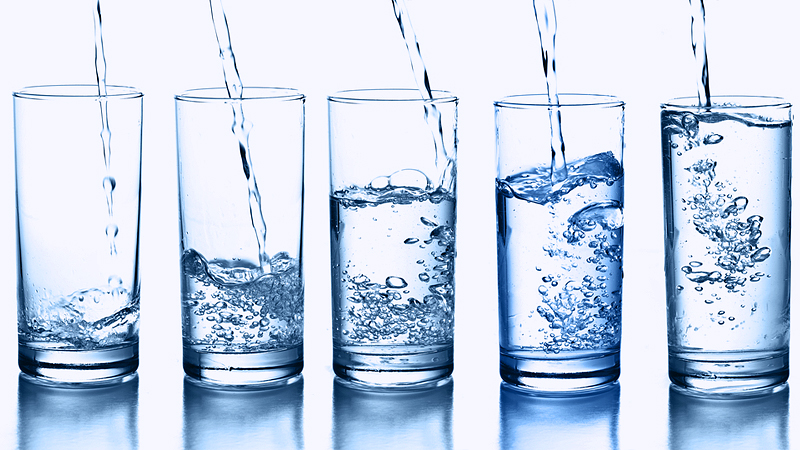 H2O is the most important nutrient we need to thrive. If we don’t get enough of it, dehydration can cause serious problems. The thing is, these days, finding a basic necessity like water could have you standing in a grocery store isle perusing hundreds of brands for an hour, and still leaving with a purchase not knowing if that was the best or safest choice. When you are focused on optimal health, you must get concerned about your water source! I’m so finicky about my water that when I see people drinking from public water fountains I literally shudder. If you missed the memo, most bottled water these days is glorified tap, and tap water in many states can contain everything from chlorine, fluoride, volatile organic chemicals, heavy metals, endocrine disrupting chemicals, parasites, and pharmaceutical drugs. If you live in New York City, you better bless your tap in the name of whoever you pray to before you drink it because in 2010 they found small crustaceans swimming around in the water source in addition to other things you do not want in your body. So, where does one begin?
H2O is the most important nutrient we need to thrive. If we don’t get enough of it, dehydration can cause serious problems. The thing is, these days, finding a basic necessity like water could have you standing in a grocery store isle perusing hundreds of brands for an hour, and still leaving with a purchase not knowing if that was the best or safest choice. When you are focused on optimal health, you must get concerned about your water source! I’m so finicky about my water that when I see people drinking from public water fountains I literally shudder. If you missed the memo, most bottled water these days is glorified tap, and tap water in many states can contain everything from chlorine, fluoride, volatile organic chemicals, heavy metals, endocrine disrupting chemicals, parasites, and pharmaceutical drugs. If you live in New York City, you better bless your tap in the name of whoever you pray to before you drink it because in 2010 they found small crustaceans swimming around in the water source in addition to other things you do not want in your body. So, where does one begin?
First off you need to understand the different kinds of water available, and the water filtration processes so that you can make the best choice for you. There’s vapor distilled, reverse osmosis, tap water, various types of filtered water, spring water, bottled water (some of which have been put through the reverse osmosis or distilled process), and alkaline water. Below is a low down on the various types of agua available out there, excluding tap. I’m not even considering tap an option, and if you are dedicated to living a healthy lifestyle neither should you. -XoXo Raw Girl
Distilled Water. When water is distilled, it means that the water is boiled, and then the steam is condensed into a clean container. Distilled water is considered “soft water” free of dissolved minerals and, because of this, has the special property of being able to actively absorb toxic substances from the body and eliminate them. Some studies validate the benefits of drinking distilled water when one is seeking to cleanse or detoxify the system for short periods of time. Fasting using distilled water can be dangerous because of the rapid loss of electrolytes (sodium, potassium, chloride) and trace minerals like magnesium, deficiencies of which can cause heart beat irregularities and high blood pressure. It tends to be harsher on the body, less hydrating, and is stripped of minerals, but during the distillation process most impurities in the water are removed.
Spring Water. The benefit of drinking spring water is that it contains natural minerals like lithium, calcium, magnesium, and sulfur. However, spring water can be dangerous depending on the source. If the spring is polluted, drinking the water regularly could lead to a host of health issues or expose you to unwanted toxins. It’s important to know the source and have it tested or at the very least do some research if you are regularly drinking from a spring.
Bottled Water. If you are going to drink bottled water, know your brands and check the source of their water. A lot of bottled water as I said is glorified tap, and also the plastic bottles can leech additional contaminants into the water. It’s always better and more environmentally friendly if possible to have your own water source and reusable bottles that you can take on the go. When buying bottled water you can find brands that claim to be distilled, reverse osmosis, or even alkaline. Those may be the best of the options, but you should still do your research.
In-Home or Basic Filters. With filtered water, like the common pitcher filters people buy in their homes, you can reduce the amount of chlorine in the water but you do not remove volatile chemicals, heavy metals, endocrine disruptors (these chemicals mimic or interfere with the hormones in your body and can wreak havoc), parasites, or fluoride. The other in-home carbon filtration systems that usually hook up to your sink can remove volatile chemicals and pesticide residue but do not remove bacteria or heavy metals. Obviously this is not the most effective at reducing many contaminants, but if it’s what you have to work with, it is most certainly better than nothing.
R.O. The reverse osmosis process involves the use of a technology that uses a semi-permeable membrane to extract most impurities from the water. This process makes it possible to remove salt from sea water. Usually most reverse osmosis water goes through several stages which may include: a sediment filter, an activated carbon filter to remove volatile organic chemicals and chlorine, a reverse osmosis filter, a second carbon filter, and finally a UV lamp which sterilizes and kills any left over cooties that survived the process. Many impurities are removed with reverse osmosis including chlorine, fluoride, metals, and parasites/microorganisms. This process may not remove some volatile organic chemicals and some pesticides, but all in all it’s pretty effective at tackling a wide range of impurities. This is the kind of water I drink most often because its easy to find and purchase cheaply by the gallon at some health food stores. You can save a great deal by buying three or five gallon jugs and filling them up regularly to get your clean water fix.
Alkaline Water. This is water that is ionized and has a pH greater than 7. Kangen Water was one of the most well known makers of a portable alkaline water machine which in its origins was used for medical purposes. Alkaline water is very powerful and if you are dealing with a serious condition can help to rapidly accelerate your healing process because of it’s ability to detoxify the body. If you are in my favorite sunny state, California, you can probably find an alkaline water store or somewhere to easily access it and buy it by the gallon. If you live in a less enlightened area of the country you may have to purchase an alkaline water system in order to have access to the water regularly. The thing is regular use, as in beyond a serious detox and healing process, may not be the healthiest thing. There really is no scientific evidence that shows that drinking water with a high pH longterm improves your health. Some believe that just like drinking water or liquids that are too acid, drinking alkaline water long term can throw the bodies’ flora out of balance and possibly inhibit nutrient absorption. Moderation in everything is key, and so it would see safe to say, drinking water at a more balanced pH is probably the best thing, with occasional splurges on alkaline water if you are detoxing. Thing to remember is that just because it’s alkaline does not mean it is filtered! You have to pay attention to what filter is used in the process before it’s ionized, to ensure you aren’t getting really un-unpure water with ions slapped onto it.





